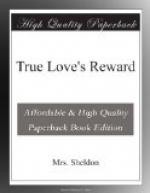“Yes,” said Mr. Corbin, “it is the truth, and, of course, it is time that it should be revealed. I have known that Mrs. Richmond Montague and Mrs. Walter Dinsmore were one and the same person ever since the death of Mr. Dinsmore. The lady came to me immediately after that event and requested me to ascertain if he had made a will. I instituted inquiries and learned that he had tried to do so, but failed to sign it. She then revealed to me that she was the wife of Mr. Dinsmore, but that they had separated only a year after their marriage, although he had allowed her an annual income of twenty-five hundred dollars for separate maintenance. She produced her certificate and other proofs that she was his lawful wife, and authorized me to claim his fortune for her, but stipulated that she was not to appear personally in the matter, as she did not wish to be identified as Mrs. Dinsmore, after having appeared in New York society as Mrs. Montague. She absolutely refused to make her husband’s niece—or supposed niece—any allowance, although I felt that it was cruel to deprive the young lady of everything when she had been reared in luxury and expected to be the sole heir, and I tried to persuade her to settle upon her the same amount that she herself had hitherto received from Mr. Dinsmore. All my arguments were without avail, however, and I was obliged to act as she required. You all know the result; Miss Mona was deprived of both fortune and home, and Mrs. Montague, as she still wished to be known, suddenly became, in truth, the rich woman she was supposed to be previously.”
“Did you know of this?” Mr. Rider asked, turning to Mr. Graves.
“I knew that a woman claiming to be a Mrs. Dinsmore had secured the fortune which should have been settled upon this young lady; but I did not know that Mrs. Montague was that woman until Miss Dinsmore, as I suppose we must now call her”—with a smile at Mona—“returned from the South. Until then I also believed that she was only the niece of my friend. If I had ever suspected the truth you may be very sure that I should have fought hard to establish the fact.”
“I suspected the fact when Miss Mona came to me, bringing her mother’s picture, and told me her story,” Mr. Corbin here remarked. “I was convinced of it after I had paid a visit to and made some inquiries of Mrs. Montague—”
“Ha!” that woman interposed as she turned angrily upon Mona, “then you did make use of that torn picture after all!”
“I took it to an artist, had it copied, then gave the pieces to Mary to be burned, as you had commanded,” Mona quietly replied.
“Oh! how you have fooled me!” Mrs. Montague exclaimed, flushing hotly. “If I had only acted upon my first impressions, I should have sent you adrift at once—I should not have tolerated your presence a single hour; but you were so demure and innocent that you deceived me completely, and I never found you out until the morning after my high-tea. Then I understood your game, and resolved to so effectually clip your wings that you could never do me any mischief.”




